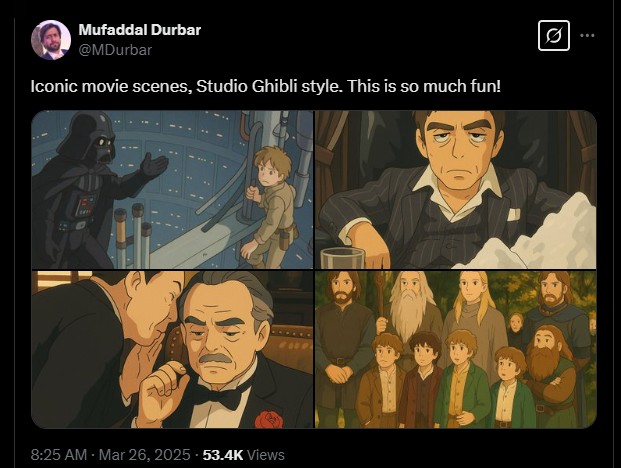
OpenAI's latest ChatGPT image generator has sparked widespread attention as users flood social media with AI-generated images mimicking Studio Ghibli's distinctive animation style. Within 24 hours of the tool's release, users have created numerous images reimagining popular figures like Elon Musk and scenes from "The Lord of the Rings" in the iconic Japanese studio's aesthetic.
The viral trend has reignited debates about copyright implications in AI-generated art. While style itself isn't explicitly protected by copyright law, questions arise about how these AI models achieve such accurate replications of Studio Ghibli's unique look.
"What are the copyright infringement implications of going out, crawling the web, and copying into these databases?" asks Evan Brown, an intellectual property lawyer at Neal & McDevitt. The legal landscape remains unclear, as courts continue evaluating whether training AI models on copyrighted works qualifies as fair use.
OpenAI states that while ChatGPT won't replicate individual living artists' styles, it permits replication of "broader studio styles." This position becomes complex considering Studio Ghibli's co-founder Hayao Miyazaki's role in developing the studio's distinctive visual identity.
The development follows Google's recent release of similar capabilities in its Gemini Flash model. Both companies face ongoing legal challenges, with The New York Times and other publishers pursuing lawsuits over alleged unauthorized use of copyrighted materials in AI training.
Testing revealed OpenAI's new image generator produced the most accurate Studio Ghibli style replications compared to competitors like Google's Gemini, xAI's Grok, and Playground.ai. The feature's popularity led OpenAI to delay access for free-tier users due to overwhelming demand.
As these AI image generators advance in capability and accessibility, the industry awaits court decisions that will shape the future of AI-generated art and copyright law.